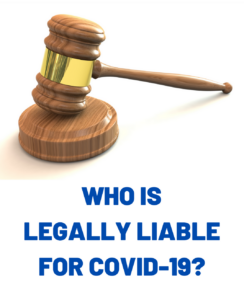By Michael Wong, JD (Executive Director, Physician-Patient Alliance for Health & Safety)
Who is Legally Liable for COVID-19?
Here’s my question to you – “Who is Legally Liable for COVID-19?”
Some say China is liable – according to a Pew Research Center survey, more than 3 out of 4 Americans (78%) “place a great deal or fair amount of the blame for the global spread of the coronavirus on the Chinese government’s initial handling of the COVID-19 outbreak in Wuhan.”
And, while some may debate whether a nation like China or any other country can be held legally liable, the difficulty of overcoming sovereign immunity makes such considerations a rather pointless mind exercise – or, as is often said in law school, a moot point.
Rather, I ask this question at a far more micro level – is the nurse, doctor, or even the emergency responder liable to a patient who contracts, has an adverse event, or dies from COVID-19 when undergoing their care and treatment?
Health Provider Liability Legislation
Representatives Phil Roe, M.D. (R-Tenn) and Lou Correa (D-Calif.) introduced H.R. 7059, the Coronavirus Provider Protection Act:
“To provide for liability protection for health care providers for damages with respect to any harm caused by any act or omission of such health care professional or related health care entity in the course of arranging for or providing health care services during the COVID–19 public health emergency period, and for other purposes.”
The intent behind H.R. 7059 and similar provisions at state levels may be to shield healthcare providers from legal liability during this COVID-19 pandemic – like “good Samaritan laws” that shield people legally when they are trying to help another. As Representative Roe explains:
“The COVID-19 pandemic upended health care delivery across the country. Health care providers have gone above and beyond to meet whatever challenges they’ve faced, but now we owe it to them to ensure they are protected from frivolous litigation. Our bill will provide targeted protections to providers who had to change how care was delivered based on public health recommendations that were constantly changing, sometimes daily. In some cases, that meant providers had to delay scheduled care or treatments; in others, it meant providers were called upon to treat COVID patients outside of their general practice area. While our bill does provide protections to providers who engaged in good-faith attempts to care for patients in accordance with state and local regulations, this bill does not provide protections to physicians who engaged in gross negligence or willful misconduct.”
The Health Coalition on Liability and Access says that H.R. 7059 is limited in scope, and points out that H.R. 7059 would apply only when:
- The act or omission occurred during the declared COVID-19 public health emergency or within 60 days of termination of the emergency;
- The act or omission occurred while providing or arranging care;
- The services were within the provider’s scope of licensure/certification, without regard as to whether the service fell within the usual scope of practice; and
- The services were provided in good faith.
The Devil’s in the Details
However, like many things in life, how such legislation actually results in whether the healthcare provider is legally liable in actual cases may be difficult to predict. The devil, as it is often said, is “in the details” or, as any good lawyer will tell you, whether a judge or jury can be convinced.
Take, for example, chloroquine or hydroxychloroquine – At the start of the COVID-19 pandemic, there were reports from China and France that suggested administering chloroquine or hydroxychloroquine would aid recovery in patients with severe symptoms of COVID-19.
Now, hydroxychloroquine is not approved by the FDA as a treatment for COVID-19 – in fact, there are currently no approved medicines for COVID-19, according to WHO – and the FDA has even noted the dangers of administering hydroxychloroquine as a treatment for COVID-19:
“The FDA is aware of reports of serious heart rhythm problems in patients with COVID-19 treated with hydroxychloroquine or chloroquine, often in combination with azithromycin and other QT prolonging medicines. We are also aware of increased use of these medicines through outpatient prescriptions. Therefore, we would like to remind health care professionals and patients of the known risks associated with both hydroxychloroquine and chloroquine.”
So, here’s a question to ponder – if a patient diagnosed with COVID-19, is administered a treatment that has not been shown to reduce mortality or morbidity due to COVID-19 (such as hydroxychloroquine or chloroquine) and suffers an adverse event or death because of the treatment, should the healthcare facility and/or its personnel be held legally accountable?
Survey on Legal Liability During COVID-19
To better understand this and other questions, and the extent to which healthcare providers should be held legally accountable for actions taken during the COVID-19 pandemic, the Physician-Patient Alliance for Health & Safety is conducting a survey.
To take the survey, please click here.

It’s interesting to learn that hydroxychloroquine isn’t really a proven medication for COVID-19. My brother is trying to help his employees stay safe during this pandemic. He really needs to find some professionals that can create some safety guards that help everyone.
Remdesivir is the first COVID-19 treatment to receive FDA approval and this just happened yesterday October 22, 2020.